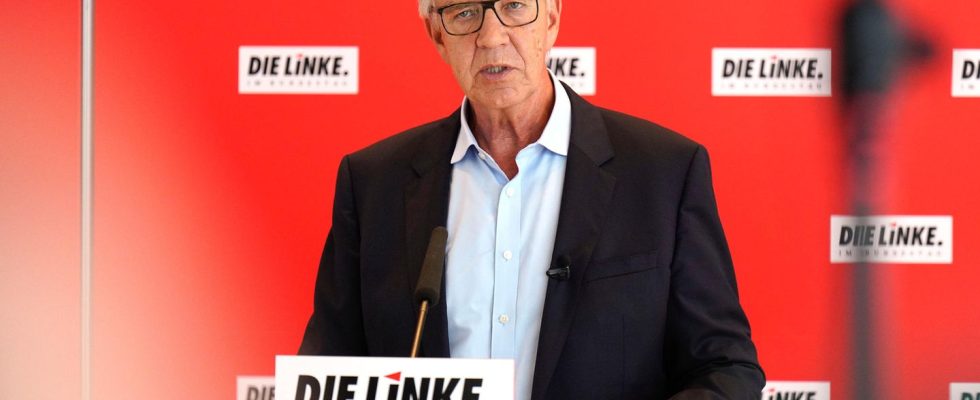For many, the news came in the middle of vacation: after Amira Mohamed Ali, Dietmar Bartsch also announced his withdrawal from the leadership of the Left Party. Is he even risking the end of his party?
In a hot summer for the left, Dietmar Bartsch had to travel north to keep a cool head: he spent time with his family on the Baltic Sea. There he finally decided a few days ago not to run again for the parliamentary group chairmanship of the left, said Bartsch on Wednesday.
After the decision, he sent an email to his group – and then went public for a few sentences.
The news that their long-standing chairman was quitting caught quite a few MPs in the middle of their vacation. So also the former party leader Bernd Riexinger. The MPs have to pull themselves together now, he says on the phone. At least those who plan to stay in the party.
For months, Sahra Wagenknecht’s camp has been threatening to found its own party. The timing of Bartsch’s withdrawal announcement is therefore politically sensitive for the party. He was considered by many observers to be one of the last with binding power. The party says that Bartsch has made arrangements with Wagenknecht supporters in the past to keep the store together.
And now?
“It’s no longer the question ifrather When this faction breaks up,” says political scientist Constantin Wurthmann dem star.
The faction trembles for money and influence
A few weeks ago, Wurthmann’s study of the amazing voter potential of a Wagenknecht party made headlines. In June, the polarizing left-wing politician announced that she would decide on founding the party by the end of the year. The Left party leadership then unanimously distanced itself: “The future of the Left is a future without Sahra Wagenknecht,” said party leader Janine Wissler at the time.
Although the party has clearly renounced Wagenknecht, some are concerned that the parliamentary group does not do so: Because if only 3 of the 39 members left the parliamentary group, the Left Party would lose its parliamentary group status and with it important posts, money and influence. Just a few days ago, Bartsch had warned his renegade party friends against leaving the parliamentary group.
Who could warn in the future? Or isn’t it even better if the Left also risks breaking up in the parliamentary group and reorganizes itself?
These questions are not just on the left’s agenda. Because the development of the left party(s) could change the political future of the country. It could drive voters into the arms of the AfD – or gather them in a new party. It could persuade the Union to form a coalition with a reformed left – in order to be able to govern at all in the upcoming state elections in the East.
But what’s next? At the end of August, the parliamentary group comes together for a retreat, and many of the MPs are meeting again for the first time after the summer break. “But talks will be held before then,” says Riexinger.
It sounds as if the fate of the left will be decided in the next few weeks. “The MPs who stay in the parliamentary group and don’t switch to a new party have to negotiate a joint solution,” says Riexinger. This must also be sustainable if MPs leave the parliamentary group and with fewer than 37 seats in parliament you lose many privileges and are only considered as a group.
Who could follow Dietmar Bartsch?
Political scientist Wurthmann finds drastic words for the upcoming retreat: There could be a “ostracism” in which only those who would escape the current situation unscathed would be negotiated. According to Wurthmann, it is a matter of political survival for the MPs affected.
The parliamentary group’s board election is scheduled for April 4.scheduled for Sept. Then a successor must be found not only for Dietmar Bartsch, but also for Amira Mohamed Ali. At the beginning of August, Mohamed Ali also announced that he would not run for the presidency again. Riexinger does not consider himself suitable to lead the group into the uncertain future. He doesn’t stand for what is needed now, he says – “an absolute new beginning”.
“Anyone who takes over the left faction now can go down with it – or change tack,” says Wurthmann. Unlike Riexinger, who has ideas for a successor but does not want to name any names, Wurthmann has at least one person in mind who would be sufficiently well-known and popular to save the left one last time: Gregor Gysi. But no matter who it is in the end: there is another change of direction that will throw some out of the curve again.
“A lot of people have harassed me”
Dietmar Bartsch actually wanted to announce on his 65th birthday at the end of March that he would no longer keep his divided faction together as chairman. But then, as he said on Wednesday, he was persuaded from all sides: “A lot of people pressured me to make a different decision” – pressured, he probably wanted to say. Perhaps a Freudian slip. Because Bartsch must have been under enormous pressure in recent weeks to keep his post eight years later.
Bartsch was one of the most important figures in the Left Party and held high offices for decades. Bartsch had repeatedly campaigned for a pension from the age of 65 – it seems as if he would now implement this demand, at least for himself.
That he could herald the end of the entire Left Party, as some on Twitter claim, is probably an exaggeration. But he clears the field on which a grueling war can now be fought – or something new can emerge.

